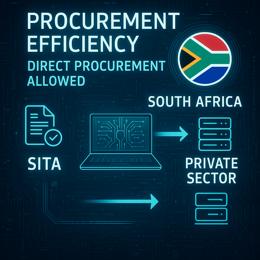Image created by AI
Cape Town Mayor Challenges Public Procurement Bill Citing Constitutional Concerns
In a decisive move to protect local governance autonomy and ensure effective service delivery, Cape Town Mayor Geordin Hill-Lewis has signaled the city's readiness to take legal action against the newly passed Public Procurement Bill. This assertive stance underscores the profound concern among municipal leaders over the potential ramifications of the Bill on local operations and efficiency.
The sweeping legislation, which awaits finalization through gazetting, has been met with staunch opposition from the City of Cape Town (CoCT). Central to the city's contention is the belief that the Public Procurement Bill violates constitutional provisions that uphold the autonomy of local governments.
As articulated by Mayor Hill-Lewis in correspondence with President Cyril Ramaphosa, the Bill's enactment would necessitate direct interventions in municipal procurement processes by the provincial treasuries and a newly established national Public Procurement Office (PPO). The PPO would wield considerable influence, imposing mandates on municipalities without the foundational cooperative governance structures or sufficient communication channels.
The implications of this overreach are particularly poignant for the speed and efficiency at which local authorities can address vital services. The legislation introduces substantial bureaucratic hurdles, hampering swift procurement - a critical factor when responding to urgent community needs such as water, sanitation, and electricity.
Moreover, the Bill centralizes procurement processes under the PPO's jurisdiction, sparking concerns over the potential for national system failures to disrupt local procurements across the country. The legislation also strips municipalities of the prerogative to deviate from set procurement regulations in times of urgent service delivery requirements without seeking centralized approval.
The Mayor raised additional concerns about the Bill's encroachment on public-private partnerships (PPPs), which have been a means for quicker infrastructure delivery. The legislation does not ease the existing arduous framework for PPP execution within municipalities, further threatening investment in essential infrastructure. The proposed law also fails to empower municipalities to harness procurement opportunities for bolstering local socio-economic development, a mandate enshrined in the Constitution.
With about 36 components of the Bill pending further regulatory clarification, the CoCT anticipates additional costs and administrative complexities for local government operations. The inclusion of the national Finance Minister as a regulatory authority over local procurement is seen as a discordant measure, conflicting with the established roles of the Auditor General and Public Protector in overseeing public procurement.
The CoCT's critique of the Public Procurement Bill extends to the threat it poses to transparency and public trust, as increased red tape carries with it the specter of opaque dealings and inefficiency. The city asserts that such a seismic policy shift, if left unchallenged, would ultimately undermine its constitutional mandate to serve its residents effectively.
Mayor Hill-Lewis remains poised to elevate the matter to a constitutional court challenge should President Ramaphosa proceed with gazetting the Bill in its current form. It is a resolute stance that highlights the critical balance between centralized regulation and local governance agility - all with the overarching objective of optimal public service delivery.










